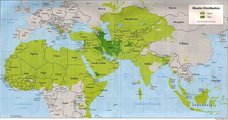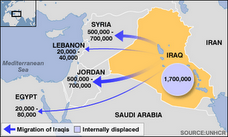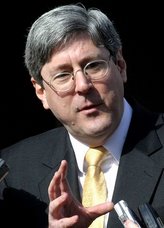 .....Mr. Tenet largely endorses the view of administration critics that Mr. Cheney and a handful of Pentagon officials, including Paul D. Wolfowitz and Douglas J. Feith, were focused on Iraq as a threat in late 2001 and 2002 even as Mr. Tenet and the C.I.A. concentrated mostly on Al Qaeda.
.....Mr. Tenet largely endorses the view of administration critics that Mr. Cheney and a handful of Pentagon officials, including Paul D. Wolfowitz and Douglas J. Feith, were focused on Iraq as a threat in late 2001 and 2002 even as Mr. Tenet and the C.I.A. concentrated mostly on Al Qaeda.Mr. Tenet describes helping to kill a planned speech by Mr. Cheney on the eve of the invasion because its claims of links between Al Qaeda and Iraq went “way beyond what the intelligence shows.”
“Mr. President, we cannot support the speech and it should not be given,” Mr. Tenet wrote that he told Mr. Bush. Mr. Cheney never delivered the remarks.
Mr. Tenet hints at some score-settling in the book. He describes in particular the extraordinary tension between him and Condoleezza Rice, then national security adviser, and her deputy, Stephen J. Hadley, in internal debate over how the president came to say erroneously in his 2003 State of the Union address that Iraq was seeking uranium in Africa.
He describes an episode in 2003, shortly after he issued a statement taking partial responsibility for that error. He said he was invited over for a Sunday afternoon, back-patio lemonade by Colin L. Powell, then secretary of state. Mr. Powell described what Mr. Tenet called “a lively debate” on Air Force One a few days before about whether the White House should continue to support Mr. Tenet as C.I.A. director.
“In the end, the president said yes, and said so publicly,” Mr. Tenet wrote. “But Colin let me know that other officials, particularly the vice president, had quite another view.”
He writes that the controversy over who was to blame for the State of the Union error was the beginning of the end of his tenure. After the finger-pointing between the White House and the C.I.A., he wrote, “My relationship with the administration was forever changed.”
“Mr. President, we cannot support the speech and it should not be given,” Mr. Tenet wrote that he told Mr. Bush. Mr. Cheney never delivered the remarks.
Mr. Tenet hints at some score-settling in the book. He describes in particular the extraordinary tension between him and Condoleezza Rice, then national security adviser, and her deputy, Stephen J. Hadley, in internal debate over how the president came to say erroneously in his 2003 State of the Union address that Iraq was seeking uranium in Africa.
He describes an episode in 2003, shortly after he issued a statement taking partial responsibility for that error. He said he was invited over for a Sunday afternoon, back-patio lemonade by Colin L. Powell, then secretary of state. Mr. Powell described what Mr. Tenet called “a lively debate” on Air Force One a few days before about whether the White House should continue to support Mr. Tenet as C.I.A. director.
“In the end, the president said yes, and said so publicly,” Mr. Tenet wrote. “But Colin let me know that other officials, particularly the vice president, had quite another view.”
He writes that the controversy over who was to blame for the State of the Union error was the beginning of the end of his tenure. After the finger-pointing between the White House and the C.I.A., he wrote, “My relationship with the administration was forever changed.”





No comments:
Post a Comment